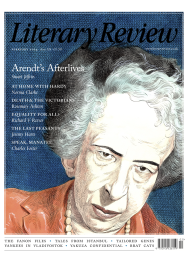Jonathan Wolff
Tomorrow is Another Election
In the Long Run: The Future as a Political Idea
By Jonathan White
Profile 264pp £20
‘In the long run we are all dead,’ wrote John Maynard Keynes in his 1923 work A Tract on Monetary Reform. Very sharp, Mr Keynes, perhaps so sharp you’ll cut yourself. The remark is open to the riposte that although Keynes and his reader will be dead, future generations have a good chance of still struggling on – unless, of course, we’re talking about deep geological time. Whether Keynes was really as indifferent to the long term as this remark suggests is open to debate. As the author of the semi-utopian ‘Economic Possibilities for our Grandchildren’ (1930), he was prepared to gaze on a more distant future, predicting, among other things, a massively reduced working week by the year 2030.
Jonathan White’s deft and attractively written new book takes its title from Keynes’s quip. At its heart is an examination of the tensions that arise when democracy comes head to head with a range of long-term issues. The sense that we are at the edge provides the context of contemporary politics, White argues. ‘Time is running out’, and we live under the threat of all-consuming emergencies. Climate change has taken over from imminent nuclear war as the most significant danger, but other spectres that haunt not just Europe but the entire world include out-of-control economic and racial inequality, international instability, artificial intelligence and, of course, pandemics. Democracy can often feel too slow-paced to deal with the crises staring us down. Does effective action on climate change, or banking reform, or pandemic preparedness really have to wait another electoral cycle or two for the right president or prime minister to come along?
Chapter by chapter, the book provides highly perceptive, engaging and sometimes startling analysis of six temporally related tensions. We time-travel through futures that are – as the chapter titles have it – open and closed, near and far, imagined and calculated, rational and impulsive, public and secret, shared and apart.

Sign Up to our newsletter
Receive free articles, highlights from the archive, news, details of prizes, and much more.@Lit_Review
Follow Literary Review on Twitter
Twitter Feed
It wasn’t until 1825 that Pepys’s diary became available for the first time. How it was eventually decrypted and published is a story of subterfuge and duplicity.
Kate Loveman tells the tale.
Kate Loveman - Publishing Pepys
Kate Loveman: Publishing Pepys
literaryreview.co.uk
Arthur Christopher Benson was a pillar of the Edwardian establishment. He was supremely well connected. As his newly published diaries reveal, he was also riotously indiscreet.
Piers Brendon compares Benson’s journals to others from the 20th century.
Piers Brendon - Land of Dopes & Tories
Piers Brendon: Land of Dopes & Tories - The Benson Diaries: Selections from the Diary of Arthur Christopher Benson by Eamon Duffy & Ronald Hyam (edd)
literaryreview.co.uk
Of the siblings Gwen and Augustus John, it is Augustus who has commanded most attention from collectors and connoisseurs.
Was he really the finer artist, asks Tanya Harrod, or is it time Gwen emerged from her brother’s shadow?
Tanya Harrod - Cut from the Same Canvas
Tanya Harrod: Cut from the Same Canvas - Artists, Siblings, Visionaries: The Lives and Loves of Gwen and Augustus John by Judith Mackrell
literaryreview.co.uk